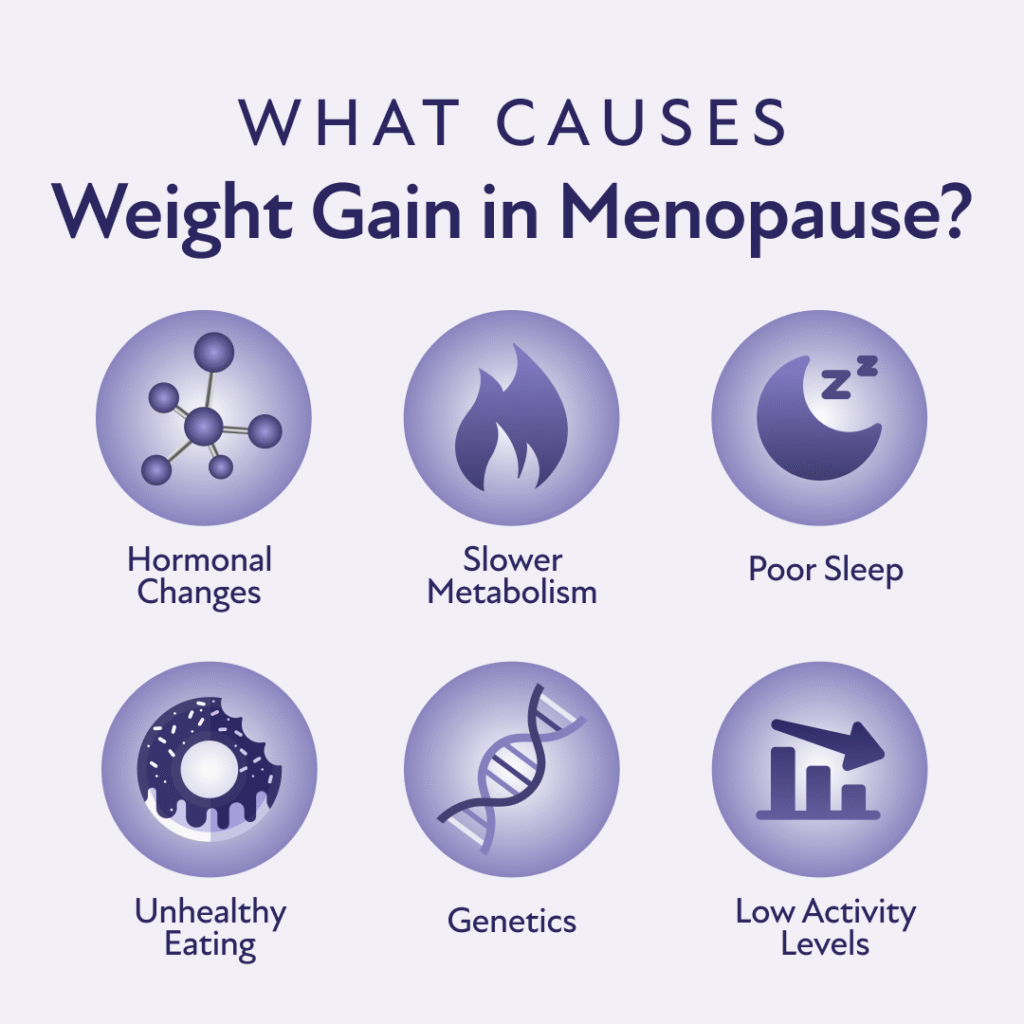Introduction
Menopause weight gain solutions are one of the most searched topics among women over 40. Many women notice that during menopause, weight gain feels inevitable—especially around the belly. This shift is not only about looks but also about health, confidence, and long-term wellness.
Weight gain during menopause is often linked to hormonal shifts, stress, and slower metabolism. What makes it particularly frustrating is that the usual diet and exercise strategies may no longer work as easily.
This article explores the reasons for menopause weight gain and shares practical, science-backed tips on how to control menopause weight gain naturally and effectively.
What Are Menopause Weight Gain Solutions?
Menopause weight gain solutions focus on understanding why fat accumulates during this stage and how to manage it effectively. Unlike general midlife weight gain, menopause-related changes are driven largely by falling estrogen levels.

When estrogen declines, the body tends to store fat more readily, particularly in the abdominal area. This explains why many women develop menopause belly fat that feels stubborn.
Early on, women often ask: how to control menopause weight gain? The answer lies in combining nutrition, exercise, lifestyle changes, and sometimes medical support into a sustainable plan.
Reasons for Menopause Weight Gain

There are several reasons for menopause weight gain that make it more challenging than at earlier ages:
- Slower metabolism: With age, the body naturally burns fewer calories.
- Hormonal imbalance: Lower estrogen and progesterone affect fat storage.
- Stress and cortisol spikes: Stress hormones encourage belly fat.
- Muscle loss: Age-related muscle decline reduces calorie-burning capacity.
Understanding these factors helps women make informed choices and find the most effective menopause weight gain solutions.
Hormonal Changes and Weight Gain in Menopause
Hormonal changes and weight gain in menopause go hand-in-hand. Estrogen and progesterone drops alter fat distribution, while testosterone decline can lead to more abdominal fat.
Another hidden factor is menopause and insulin resistance, which makes the body less efficient at using glucose and increases cravings. Combined with menopause and slow metabolism, these changes explain why fat storage accelerates.
Recognizing the hormonal link is the first step toward adopting smarter menopause weight gain solutions.
Menopause Belly Fat Solutions
One of the biggest complaints during this stage is stubborn belly fat. Effective menopause belly fat solutions include:
- Prioritizing strength training to rebuild muscle mass.
- Increasing protein intake for satiety and metabolism support.
- Cutting down on added sugars and refined carbs.
These strategies help reduce visceral fat and improve overall health.
Diet Tips for Menopause Weight Gain
When it comes to nutrition, smart choices make a huge difference. Practical diet tips for menopause weight gain include:
- Focus on low-GI foods to avoid sugar spikes.
- Eat plenty of fiber-rich fruits, veggies, and whole grains.
- Stay hydrated, water supports digestion and metabolism.

Many experts also highlight the best foods to reduce menopause weight gain, such as leafy greens, salmon, beans, and nuts.
Diet changes are essential building blocks of menopause weight gain solutions.
Exercise for Menopause Weight Gain
Movement is one of the most reliable menopause weight gain solutions. The best approach combines:
- Cardio (walking, cycling, swimming) for calorie burn.
- Strength training to rebuild lost muscle and boost metabolism.
- Yoga or Pilates to reduce stress and improve flexibility.
Regular activity not only helps manage weight gain during menopause but also reduces the risk of osteoporosis and heart disease. For long-term success, exercise is key in how to control menopause weight gain.
Lifestyle Changes for Menopause Weight Gain
Alongside diet and exercise, sustainable lifestyle changes for menopause weight gain are crucial:
- Stress management: Chronic stress fuels belly fat. Practices like meditation, deep breathing, or journaling can help.
- Quality sleep: Poor sleep increases hunger hormones and leads to overeating.
- Mindfulness: Being aware of eating habits prevents emotional eating.
These shifts also connect with natural remedies for menopause weight gain, such as calming teas, mindful routines, or supplements.
Natural Remedies for Menopause Weight Gain
While not a quick fix, holistic natural remedies for menopause weight gain can support balance:
- Herbal teas (green tea, black cohosh, red clover).
- A plant-based, nutrient-dense diet.
- Omega-3 fatty acids for hormonal health.
These work best when combined with diet and exercise, forming part of a complete menopause weight gain solution strategy.
FAQs on Menopause Weight Gain Solutions
Q1: Is weight gain normal during menopause?
Yes, but it’s not inevitable. With the right menopause weight gain solutions, it can be managed.
Q2: What are the best foods to reduce menopause weight gain?
Whole grains, lean proteins, leafy vegetables, and healthy fats.
Q3: How to stop menopause weight gain after 50?
Commit to consistent diet, exercise, and stress management.
Q4: Does menopause cause slow metabolism?
Yes, menopause and slow metabolism often work together to make weight loss harder.
Q5: Is menopause linked to insulin resistance?
Yes, menopause and insulin resistance can increase belly fat storage.
Conclusion
Menopause weight gain solutions require a mix of awareness, science-backed strategies, and lifestyle consistency. While hormonal changes, slow metabolism, and stress make weight gain during menopause common, it is not unavoidable.
By combining diet tips for menopause weight gain, exercise routines, and lifestyle changes for menopause weight gain, women can take back control. Adding natural remedies for menopause weight gain further supports long-term balance.
The takeaway? Menopause weight gain is manageable. With the right steps, women can thrive through this stage with health, energy, and confidence.
For personalized support, consult a doctor or nutritionist for tailored menopause weight gain solutions.
Related Articles
Menopausal Weight Gain: 10 Effective Tips and Reasons
High Blood Sugar Weight Gain: Proven Causes and Effective Fixes
Can Gallstones Cause Weight Gain?
Can Gallbladder Issues Cause Weight Gain?

